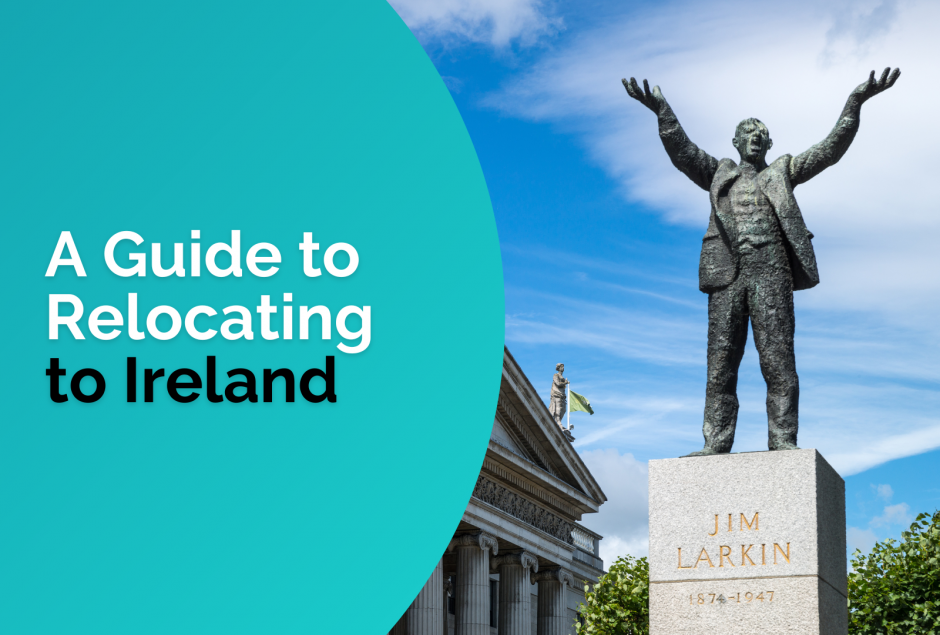 Menu
Menu
 Menu
Menu
If you've ever considered living and working abroad, it's essential to explore the country you plan to move to. In this article, we will provide you with an overview of Ireland, including its geography, climate, politics, education system, economy, and social life. Ireland, located in Europe, offers a unique and vibrant experience for individuals seeking new opportunities. Let's dive into what makes Ireland an attractive destination for those looking to embark on an international adventure.
 Ireland's Geography and Climate
Ireland's Geography and ClimateIreland's geography is characterised by low mountains, hills, and expansive agricultural land. The island is crisscrossed by rivers, contributing to its picturesque landscapes. The island's geography is crucial to understanding Ireland's climate, which is humid and mild. The strong influence of oceanic winds makes Ireland well known for its rainfall, with Atlantic Surgical depressions occasionally bringing strong winds of up to 160 km/h (100 mph) to the western coastal regions during the Winter months.
January and February are the coldest months of the year and the average daily air temperature falls between 4 and 7°C during these months. July and August are the warmest, with temperatures averaging 14 to 16°C. May and June receive the most sunshine, with approximately five to seven hours of sunshine per day.
Ireland is made up of 32 counties, which are divided into four provinces: Connacht, Leinster, Munster and Ulster. Six of the nine counties of Ulster form Northern Ireland, which is part of the United Kingdom – the other 26 form the Republic of Ireland. The population of the Republic of Ireland is currently around the 4.8 million people mark.
Ireland's capital city is Dublin, which is on the east coast of the island and is home to over 544,000 people. It is a city full of culture, history, entertainment, shopping and much more. Dublin is one of the leading destinations in Europe for tourists. Other popular cities and towns around the country include Cork, Limerick, Galway, Westport and Killarney.

Ireland stands as one of the most developed countries globally, evident in its high standard of living and robust economic indicators. Since its membership in the European Union in 1973, Ireland has adopted the euro as its official currency. Over the years, this Emerald Isle has undergone significant socio-economic transformations. In the mid-20th century, it was recognised as "the poorest country in the rich world," but by the early 2000s, it had emerged as the Celtic Tiger.
Following the financial crisis of 2008, Ireland experienced a notable economic downturn. However, it managed to rebound and has since become a magnet for immigration from various corners of the world. People are attracted to Ireland for numerous reasons, such as opportunities to learn English, job opportunities, its favourable location in Europe, and the warm reception offered by the Irish community.
Today the services sector accounts for just over 60% of its GDP, which is $516 billion. Commercial export and import activities drive a large part of the country's economy, placing it as the 14th largest importer in the world. The country purchases products such as refined petroleum, aircraft and computers from abroad. Exports are mainly made up of packaged drugs, medical cultures and vaccines. Its main trading partners are: United Kingdom, United States, Belgium, Germany and China.
Therefore, the pharmaceutical industry takes centre stage in Ireland's economic landscape. It plays a pivotal role in driving the country's growth. Additionally, the secondary sector, which constitutes 11% of the GDP, encompasses sectors like beverages, chemicals, computers, and medical equipment. Agriculture and livestock contribute to 5% of the GDP, with potatoes being one of the primary agricultural products cultivated in Ireland. Anyone wanting to know the secret of the supposed Irish "miracle" should read the report "Ireland 2040", overseen by the then Deputy Prime Minister, Frances Fitzgerald.
Ireland operates as a constitutional democracy. The country has a national parliament, with a Prime Minister (Taoiseach) as its leader. The parliament consists of the lower house, called Dáil Éireann, and the upper house, known as Seanad. The position of the President of Ireland is generally a ceremonial one, and they act as an ambassador for the country both domestically and internationally. The term for the presidency is seven years, and the current President is Michael D Higgins. As a member of the European Union, Ireland actively participates in the European Parliament.
Public education in Ireland is available to all citizens and residents, and it upholds high standards of quality. The vast majority of schools are affiliated with religious communities, but they receive funding from the government. In addition to state schools, there are also public schools, primarily located in Dublin.
While Ireland recognises two official languages, classes are taught in English (with the exception of a Gaelscoil, where all subjects are taught through the Irish language). In non Gaelscoileanna, the Irish language still holds a significant place in the school curriculum as a compulsory subject, except for international students.

Irish people as a whole are very sociable and enjoy spending time together with friends and family. The pub is one of the main areas of socialising, where people come together to get to know each other. There will be storytelling and traditional music often played in pubs, reflecting some of the deep-rooted aspects of Irish culture. Irish people are generally very friendly and welcoming, so there will always be a thriving social scene for you, no matter what your interests are.
If you are interested in relocating as a pharmacist, nurse or family doctor in Ireland, please contact me directly! I would be happy to discuss the amazing opportunities available as well as how Clarity can support you in your move.
